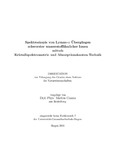Citation link:
https://nbn-resolving.org/urn:nbn:de:hbz:467-1325Files in This Item:
| File | Description | Size | Format | |
|---|---|---|---|---|
| czanta.pdf | 3.81 MB | Adobe PDF |  View/Open |
| Dokument Type: | Doctoral Thesis | metadata.dc.title: | Spektroskopie von Lyman-alpha Übergängen schwerster wasserstoffähnlicher Ionen mittels Kristallspektroskopie und Absorptionskanten-Technik | Authors: | Czanta, Markus | Institute: | Fachbereich 7, Physik | Free keywords: | Quantenelektrodynamik, Kristallspektrometer, Schwerionenphysik | Dewey Decimal Classification: | 530 Physik | GHBS-Clases: | UHTK | Issue Date: | 2001 | Publish Date: | 2006 | Abstract: | Spektroskopie von Lyman-α Übergängen schwerster wasserstoffähnlicher Ionen mittels Kristallspektroskopie und Absorptionskanten-Technik Die ausstehende Überprüfung der Quantenelektrodynamik im Fall sehr starker elektrischer Felder, wie sie durch die Spektroskopie von Lyman-α Übergängen schwerster wasserstoffähnlicher Systeme zugänglich ist, erfordert die Entwicklung neuartiger experimenteller Ansätze. Daher erfolgte der Aufbau eines Kristallspektrometers. In Labormessungen konnte eine Energieauflosung von 60 eV für Photonen mit einer Energie von 50 keV erzielt werden. Für das Detektionssystem auf Basis einer Driftkammer wurde eine Linearität der Ortsauflosung von 200 µm verifiziert. Ferner erfolgte der Nachweis einer erhohten Dunkelrate bei Verwendung von Xenon als Detektorgas. Schließlich wurde das Ausleseverfahren an die Verhältnisse am Gasjet-Target des Experimentier-Speicher-Rings ESR der GSI Darmstadt angepaßt. Dieses Spektrometer wurde erstmalig am ESR eingesetzt, jedoch konnten wegen einer zu geringen Effizienz keine quantitativ verwertbaren Resultate erzielt werden. Ferner wurde am ESR eine Messung an wasserstoffähnlichem Gold mit der Absorptionskanten-Technik durchgeführt. Durch geometrische Überbestimmung gelang der Nachweis von Abweichungen des Ionenstrahls von der Sollachse, welche infolge des Dopplereffekts Verschiebungen der Photonenenergien von etwa 200 eV implizieren. Es konnte die 1s-Lambverschiebung von Au 78+ zu (210,5 ± 8,8) eV bestimmt werden. Die relative Genauigkeit in der photonischen Energiebestimmung ist mit 1,27 à 10 -4 die hochste, welche mit der Absorptionskanten-Technik bislang erzielt werden konnte. Die Ergebnisse zeigen, daß eine absolute Auflosung von 1 eV erreichbar ist. The theory of Quantumelectrodynamics in the case of strong electric fields still remains untested. An experimental verification with an accuracy comparable to modern calculations can be realized by the spectroscopy of Lyman-α transitions of heavy, highly-charged atomic systems. However, new kinds of experimental approaches have become indispensable. Therefore, a special crystal spectrometer has been set up. An energy resolution of 60 eV for photons of 50 keV energy has been verified. The detection system used is based on the principle of a drift chamber. It exhibits a linearity in position resolution of 200 µm. Investigations show an increased darkrate when Xenon is used as the detector gas. In addition, the electronic read-out system has been adjusted to the conditions at the gasjet-target of the ESR storage ring at the GSI Darmstadt. Moreover, an experiment at the ESR storage ring was performed with this spectrometer for the very first time. Due to the low efficiency of the spectrometer, no quantitative results could be obtained. Making use of these detectors, an experiment exploring the hydrogen-like system Au 78+ was performed at the ESR, based on the absorption-edge technique. As a result of the stringent geometrical control applied, deviations of the ion-beam from its expected position have been found. These imply a change in photonic energy of about 200 eV as induced by the Doppler shift. Nevertheless, the 1s-Lambshift of Au 78+ could be determined to (210.5 ± 8.8) eV. The relative accuracy in the determination of photonic energies of 1.27 à 10 -4 represents the most precise one reached with the absorption-edge technique. Moreover, the experimental results show that an absolute energy resolution of 1 eV is attainable. |
URN: | urn:nbn:de:hbz:467-1325 | URI: | https://dspace.ub.uni-siegen.de/handle/ubsi/132 | License: | https://dspace.ub.uni-siegen.de/static/license.txt |
| Appears in Collections: | Hochschulschriften |
This item is protected by original copyright |
Page view(s)
460
checked on Nov 28, 2024
Download(s)
406
checked on Nov 28, 2024
Google ScholarTM
Check
Items in DSpace are protected by copyright, with all rights reserved, unless otherwise indicated.

